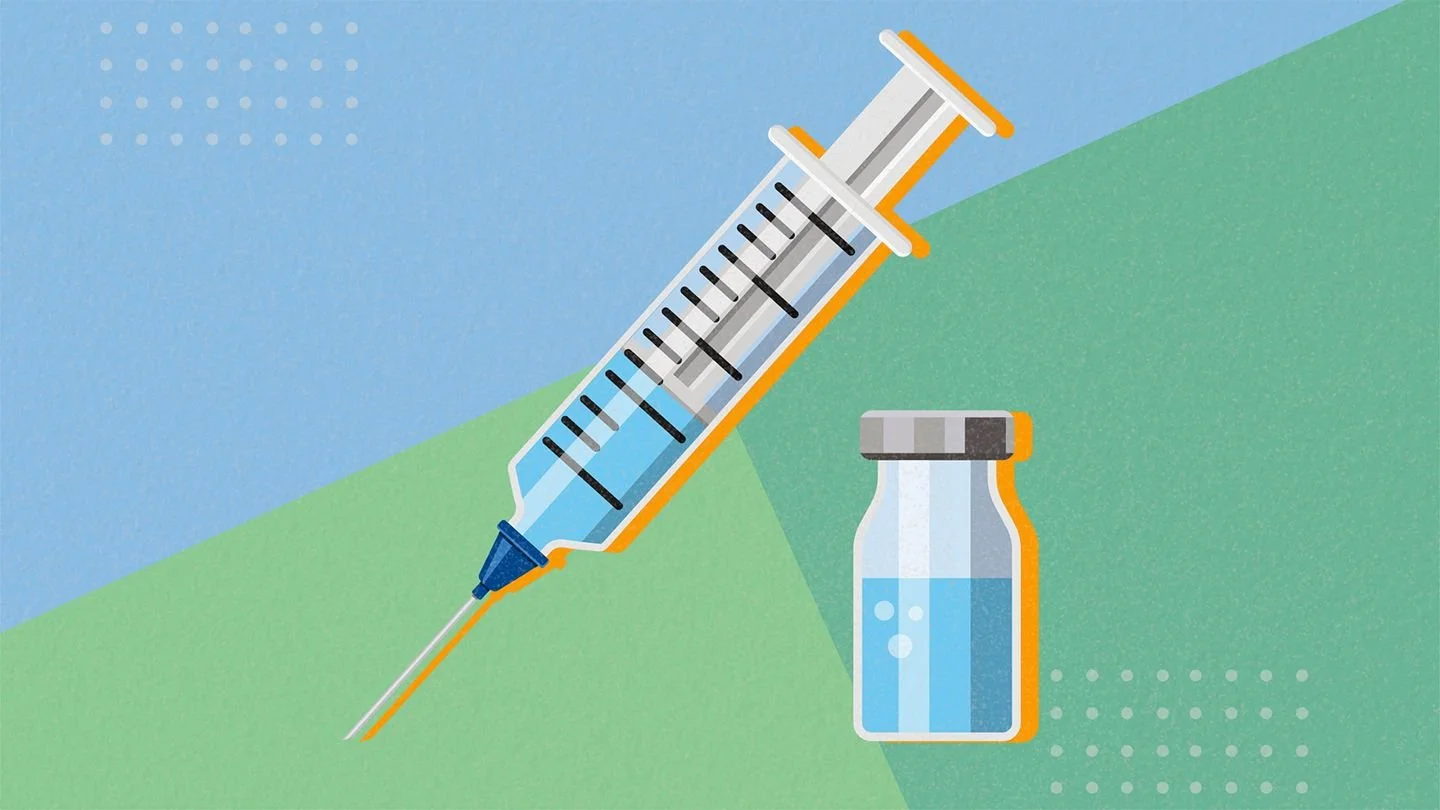5 Common Myths About the Flu Shot
Every fall and winter, influenza or “flu” season comes around. During this time, it’s important to get a flu shot in order to protect yourself and others. But a lot of people don’t get their flu shot every year, and this can be because of some common myths about the flu vaccine. We will cover 5 common myths about the flu shot, and why they aren’t true!
Myth 1: The flu shot doesn’t work
Almost every family has someone with this anecdote: Whenever they get the flu shot they get sick anyway. Why bother getting a stick in the arm if it doesn’t even work?
What an influenza virus looks like
Source: https://micro.magnet.fsu.edu/cells/viruses/influenzavirus.html
While it’s true that it is possible to still get the flu even with the flu shot, this doesn’t mean that the vaccine doesn’t work. The flu shot prevents a lot of people from getting sick or going to the hospital from the flu. In the last flu season prior to the COVID-19 pandemic, the CDC estimated that the flu shot prevented 7.52 million illnesses, 3.69 million medical visits, 105,000 hospitalizations, and 6,300 deaths due to the flu in the United States. No vaccines are 100% effective, but even if you get sick, the flu shot can help prevent you from getting as sick as you would have without the shot!
Another reason why the flu shot might not always work is because of the many different types of flu viruses that exist. There are way too many viruses to develop a vaccine for and give in one shot. So scientists start by estimating which viruses are likely to be the most common in the upcoming flu season. The World Health Organization (Also known as the WHO) gets information from 144 national influenza centers from around the world. The influenza centers test samples from patients who have the flu all year round. The WHO then assembles a committee of specialists to look at this data and recommend what flu viruses to protect against in the next flu vaccine. Then scientists in each country make a flu vaccine targeted to fight 3 or 4 types of flu virus which then gets packed into what we call the flu shot. While there is a lot of data and effort that goes into picking which viruses get targeted by the flu shot, it’s always possible that you can get sick with a different type of virus going around. The flu shot lasts 6 months and if you are vaccinated early in the season (in September or October), it will help protect you all fall and winter.
References:
How protective is the flu shot?:
How are viruses selected for the flu shot?
Myth 2: The flu shot can make you sick
This myth comes from similar anecdotes as myth 1. For some people it seems like the only time they get the flu is when they get the vaccine. So maybe the vaccine is actually giving them the flu? Some people are also concerned about active viruses being in the vaccine and infecting them. In the past, a lot of vaccines contained a weakened version of the virus that they were trying to prevent. These vaccines are called ‘live virus’ vaccines, and even though they contain the virus, they are so weak that they aren’t able to make you sick. And if live vaccines still make you nervous, don’t worry! The flu shot is not a live vaccine. It contains only part of an already killed virus so there is no way it can get you sick. The vaccine works by introducing your immune system to what the virus looks like. That way if you become infected with that type of virus in the future, your immune system recognizes the virus and can fight it off before you get sick.
If you have received a vaccine before like the flu shot or the COVID-19 vaccine, you may have felt bad for about a day afterward. Even though this feels like getting sick, this is just your immune system being activated after the vaccine. Any of these side effects should only last a day or two at most, and most people don’t experience them at all. If you do feel nauseous or achy after getting your flu shot, drink lots of water and get plenty of rest. You will feel better in no time!
References:
How flu shots are made:
Why can you feel sick after a flu shot?
Myth 3: Doctors push the flu shot because it makes them money
Insurance companies reimburse doctors for giving vaccines to patients. This is sometimes pointed to as a reason why doctors want you to get the vaccine. But doctors may not make a profit even with this reimbursement.
It is important to mention why insurance companies reimburse doctors for things like giving vaccines. If someone is sick and requires treatment from a doctor or from the hospital, the insurance company has to pay for some or all of that treatment. The insurance companies don’t want to do that because expensive treatments make them lose money. So they try to encourage doctors to do less expensive things that prevent injury or disease. This means that these insurance companies understand that vaccines are something easy and inexpensive that prevent the higher cost of treating someone with a serious case of the flu.
Alternatively, doctors also might not make any money from giving you the flu shot at all. In 2009, a study was published comparing the amount that doctors received from giving the flu shot compared to what they spent. To do this, they calculated the cost per injection (excluding the cost to buy the vaccine) by adding up the cost of the labor of the doctors and nurses, billing services, supplies, medical waste disposal, etc. They found that the cost per injection varied depending on the doctor's office, but ultimately the expense often outweighs what they make back from the insurance companies.
Doctors do not receive any money directly from pharmaceutical companies by administering medication or vaccines. Healthcare workers and doctors go into medicine primarily to help keep people healthy. If it feels like they are pushing the flu shot or other vaccines, it is because they want to do their best to protect you from getting sick.
References:
Cost of vaccine administration among pediatric practices
Myth 4: If you have a good immune system you don’t need to get the flu shot
Antibodies have two arms that will bind to the virus (the antigen) and mark it to be destroyed by your immune cells.
Sometimes people won’t get vaccines because they claim to trust their immune system to take care of them. But getting vaccinated is teaching your immune system to do what it does best. When you get sick, your immune system immediately starts fighting the invading virus or bacteria. This is called your “innate” immune system and it will start to fight off anything that shouldn’t be in your body. But it takes some time for your immune system to make something called “antibodies” which are a part of your “addaptive” immune system. Antibodies are proteins that circulate in your blood. They have arms that bind to invading viruses or bacteria and “neutralize” them. This stops the infection from progressing, and also marks the foreign body to be eaten by other immune cells. These antibodies are highly specific, and they need to learn how to recognize each type of invader. If you get the flu virus without being vaccinated, by the time your body learns how to identify the virus and make antibodies you may be sick for a few days already. The virus also takes longer to clear from your body at this point. But if you get a vaccine, your body has time to build up antibodies without the invading virus. It’s almost like going to the gym, but for your immune system. Then if the virus enters your body, your immune system can fight it off before you even notice!
You have probably heard the term “herd immunity” before. This means that when the majority of the population is vaccinated against a disease, that the people who aren’t vaccinated or who are more at risk of getting the disease anyway are protected, even if they can’t get the vaccine themselves. Some people can have weakened immune systems, or can be allergic to the flu shot, which means that they can’t get the vaccine. These people rely on herd immunity in order to stay healthy, so it is our duty to protect them by getting vaccinated. If you are young and healthy, you might not worry about getting seriously sick if you come in contact with a flu virus. But you probably know someone who could get really sick if you transmit the flu to them. People who are older, like your grandparents, or people who have chronic illnesses are more likely to be hospitalized after getting the flu. When you are vaccinated you protect both yourself and others!
Myth 5: Getting the flu shot is too expensive and time consuming
If you are covered by insurance, getting the flu shot should be free and easy! Most insurances will cover 100% of the cost of your flu shot, and there are lots of places that offer it. If you have a doctor’s appointment in early fall, this is a great time to be vaccinated. Most pharmacies, including the one in grocery stores, also offer free vaccines with insurance. You don’t need an appointment. Just walk up and ask to get your flu shot. If the pharmacy is not busy, you can be in and out in under 5 minutes! If you are under 18, you will just need a parent or guardian to go with you.
For those who aren’t covered by insurance, the flu shot can cost between $24 and $110 dollars out of pocket depending on where you go. Find out where to get a flu shot and how much it will cost here. There are also programs that offer the vaccine for free, especially for minors. The CDC has a Vaccines for Children program offers free flu shots and other vaccines for children younger than 19 years of age who fall under at least one of these categories:
Medicaid-eligible
Uninsured
Underinsured
American Indian or Alaska Native
Find out more about the Vaccines for Children Program here
Your state also probably has a way to receive your flu shot for free through the Department of Health. Click here to find out where to get a flu shot for free without insurance in any state. The Delaware Department of Health has information on where to get a flu vaccine here.
Getting the flu shot is a safe and easy way to protect yourself and others from the flu every year. Hopefully this article has helped you understand the flu vaccine a little bit better!
Additional Information about the flu vaccine
How to sort through vaccine information:
Where to get a flu shot and how much it will cost:
Find out about the Vaccines for Children Program:
Where to get a flu shot for free without insurance in any state:
Delaware Department of Health:
































